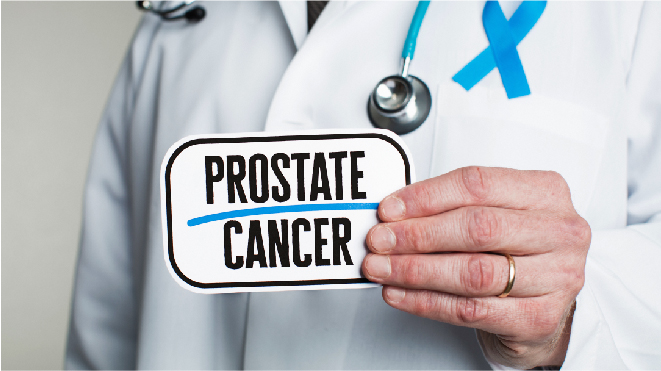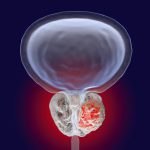Prostate cancer occurs in the prostate, a gland in the male reproductive system. Read more about prostate cancer here.

The abnormal growth and division of cells in any part of the body causes cancer. The prostate is an exocrine gland that is responsible for the urine control and the secretion of fluids which are useful outside the body. It produces a fluid that transports and nourishes the sperm to fuse with the female ovum or egg. It causes the contraction of the fluids and forces these out during orgasms. Prostate-specific antigen (PSA), a protein ejected by the prostate helps the semen to remain in its liquid state.
What are the causes of prostate cancer?
Cancer tumours mainly develop because rapid multiplication of the cells which have undergone genetic mutations, rarely these genetic mutations are inherited. Prostate cancer develops in men who have breast and ovarian cancer in their family history. Genetic mutations are of the following two types:
Inherited genetic mutations:
A few DNA mutations can pass on from one generation to another. The cancer caused due to them are referred as hereditary prostate cancer. They make 5% to 10% of the prostate cancers. The most common genes that are responsible for causing prostate cancer are:
- RNASEL: This is a tumour suppressor, which on mutations, aids in the growth of the abnormal cells in the body.
- BRCA1 and BRCA2: These tumour suppressors do not repair the damage of the cells but mutations in these genes leads to prostate cancer in a few cases.
- DNA mismatch repair genes (such as MSH2 and MLH1: The genes generally help in fixing the mismatches in the DNA. Men with abnormalities in these genes are at a slightly higher risk of developing prostate cancer {5.5}.
- HOXB13: This Gene is responsible for the development of the prostate gland. Though rare, mutations in these genes result in developing an abnormal prostate gland that can cause cancer at an early age.
Acquired gene mutations:
Most of the prostate cancers are developed as a result of acquired gene mutations. These mutations are not carried forward to the upcoming generations. Abnormal mutations of the DNA during the division of genes results in acquired gene mutations.
There are a few factors like diet, age, race, geological conditions and smoking which do not directly develop cancer but cause a few diseases which develop into prostate cancers. Read more about risk factors of prostate cancer here.
Prevention of prostate cancer:
There are certain preventive measures that can be taken in order to avoid the development prostate cancer:
- Consume lots of fruits and vegetables rich in nutrients, especially those which are rich in antioxidants, especially lycopene.
- Include soybeans and tea in your diet. These food are rich in isoflavone which reduces the risk of developing prostate cancer
- Drinking lots of coffee contributes in preventing prostate cancer
- Avoid animal-based and plant-based fats
- Replace butter with olive oil
- Avoid prepackaged foods
- Consume lots of nuts and seeds
- Quit smoking
- Intake of fish or fish supplements and Omega-3 fatty acids also helps in reducing the risk of prostate cancer
- Have a check on the folate levels in the blood. Lowered folate levels increase the risk of developing prostate cancer.
- Avoid man-made supplements of folate
- Reduce the consumption of dairy products
- Regular exercising
- Regular health check ups
- Maintain healthy weight
Read more about follow up for prostate cancer after treatment here.



